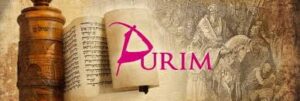So the Jews Agreed
to Continue the Celebration They Had Begun
9: 23-25
So the Jews agreed to continue the celebration they had begun DIG: What was the controversy Mordecai was trying to clear up? What was his conclusion and command? How is this story telescoped here? Why? What is the pur? Why do you think the author chose to summarize here? How did the king act when the plot against the Jews was brought to his attention? What does this section say about how the Jewish people viewed Mordecai?
REFLECT: How do you react when spiritual matters are brought to your attention? Do you lead? Do you follow? Do you get out of the way? Is it sometimes wise to get out of the way? When? Why? Aside from the manner in which they were executed, how do you feel about Haman and his ten sons dying? Do you think they were executed because of human revenge or Godly justice? How can you tell the difference?

It is hardly necessary to record the Jewish agreement to Mordecai’s instructions about Purim unless it reconciles different established customs. So the Jews agreed to continue the celebration they had begun. The first observance was a spontaneous one. But they were obedient to continue to observe the feast on a yearly basis, doing what Mordecai had written to them (9:23). They agreed to continue both what they had begun themselves (which was for those in unwalled cities to celebrate Purim on the fourteenth day (9:21), and for those living in walled cities to celebrate the feast on the fifteenth day of the month of Adar), and what Mordecai had written to them (namely, that they should celebrate the feast on both days).118 The next two verses provide the historical background, beginning with the plot of Haman.
The author summarizes for the reader the events that led to the establishment of the celebration of Purim. It was necessary for the Jews throughout the empire to appreciate the full significance of the festival. In the provinces, all they knew was that there had been a decree permitting them to defend themselves against their enemies. They had defended themselves successfully and were, quite naturally, determined to celebrate the occasion. What they do not know, and therefore, what Mordecai must tell them, is of the events in Susa that lay behind the fateful thirteenth of Adar.119 Consequently, the story is telescoped.
Though the author missed the opportunity to mention Haman’s ancestry on the previous occasion, he referred to him here, for his final appearance in the book, and Haman bears the full brunt of his symbolic name. For Haman son of Hammedatha, the Agagite – and now for the first time – the enemy of all the Jews (previously he had merely been called the enemy of the Jews). Haman had plotted against the Jews to destroy them and had cast the pur, that is, the lot (to see link click Av – The Lot Fell on the Twelfth Month, the Month of Adar, in the Presence of Haman), to crush and destroy them (9:24). There seems to be a play on words by similarity in sound of Haman (haman) and to crush them (hummam).
But when the plot came to the king’s attention (9:25a). The word plot is not in the Hebrew. The Hebrew verb came has a feminine pronoun that could be translated either she (Esther), or it (plot). Therefore, some translate it: When Esther came before the king. But on contextual grounds it is preferable to consider the feminine pronoun to refer to the plot, which is understood in the previous part of the verse (9:25a), and maintain the NIV translation.120
When the plot came to the king’s attention, he issued written orders that the evil scheme Haman had devised against the Jews should come back onto his own head, and that he and his sons should be impaled on poles (9:25b). Here, the king is credited with carrying out the just punishment on the evil Haman and his sons, without anyone’s intervention. The fact that Esther had given him the idea was a detail that did not need to be dwelt upon in this summary. The words here are not to be taken to mean that Haman and his sons were impaled at the same time. Since this is a brief summary, it does not mention the time difference between his death and that of his sons.
Dear Heavenly Father, Praise Your power and love and Your promise that: No weapon formed against you will prosper and you will condemn every tongue that rises against you in judgment. This is the heritage of Adonai’s servants – their vindication is from Me.” It is a declaration of ADONAI (Isaiah 54:17). Praise You Father God that You are wiser and stronger than all the armies of the world (Revelation 19:19-21, 20:7-10).
It is such a comfort to know that the Sovereign ruler of the world cares about His children (John 1:12, 5:24) and listens when they pray to him. Thank You that when problems knock at the door, the best thing Your child can do is to run to You and pray. Then may they watch to see Your mighty power at work, listening to what You tell them to do while they leave the burden of the problem in Your mighty hands and rejoice over Your care and Almighty power. Do not be anxious about anything – but in everything, by prayer and petition [ask] with thanksgiving, let your requests be made known to God. And the shalom of God, which surpasses all understanding, will guard your hearts and your minds in Messiah Yeshua (Philippians 4:6-7). In Yeshua’s holy name and power of His resurrection. Amen



Leave A Comment